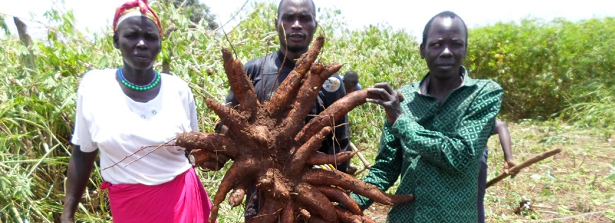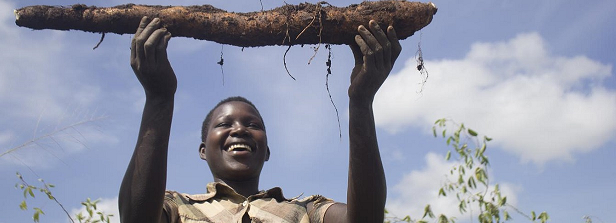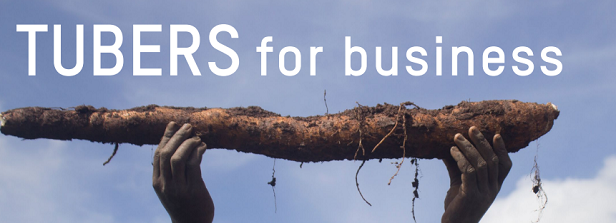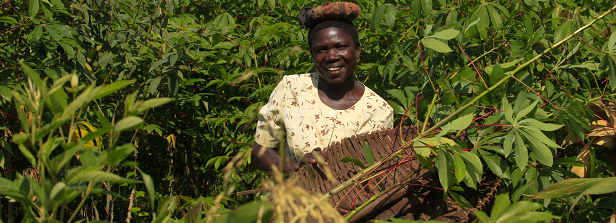Cassava Applied Research for Food Security in Northern Uganda

Duration: January 2016 – January 2019. This project has been finalized.
Project information
Aim: This project will focus on cassava, the most important staple crop in this region of Northern Uganda. To sustainably improve the food and income security situation, initiatives will aim to boost production and utilization and improve market access.
Objective: The objective of this project is to improve the food and income security situation of 2,500 direct beneficiaries, of which 60% will be female, in the districts of Pader and Oyam in Northern Uganda, through applied research on cassava to boost production and utilization by 2018.
Method: The project will be implemented through a co-creation approach, where NaCRRI, will work closely with farmers, NGOs, and the Private Sector. Project interventions will be based on applied research where NACRRI will work with farmers to evaluate and test the near-release six cassava varieties; increasing farmers’ knowledge on disease management, increasing farmer access to quality cassava planting materials as well as improve quality of cassava and cassava products for better market access.
Country: Uganda.
Dutch policy goals: Increased sustainable agricultural production; Improved access to better nutrition; and More efficient markets.
Progress reports
Year 1: The Cassava Applied Research for Food Security in Northern Uganda project focuses on addressing challenges to increased cassava production namely low yields, limited acreage under cassava production per household, high post-harvest deterioration and low prices offered for fresh cassava roots and traditional dry chips among others. The project is an applied research project where NaCRRI together with the other consortium members are evaluating and testing the near-release six cassava varieties and also improve access by farmers of the existing varieties. Furthermore the project is building the capacity of farmers in improved farming methods, postharvest handling, value addition and marketing. In light of this, the project is contributing to generating new solutions and knowledge to the problem of food security in northern Uganda specifically in two districts of Oyam and Pader.
Year 2: Political: At national level, there was amendment of the constitution, specifically to remove the presidential age limit. This process led to shrinking of the civil society space especially in our advocacy and influencing work. However, it has not had direct impact on the delivery of project activities since most of the work happens at sub county level. On a positive note, there is acceptance of the project by the local governments where our project is located. The district officials have appreciated the project approaches and have committed to support project activities to ensure roll-out and sustainability. For example, we have had the District Agricultural Officers, Community Development Officers and extension workers being part of project activities such as, trainings, monitoring and evaluation. The project partners have even been requested to expand the project beyond the target sub counties to maximize impact.
Social: The project participants appreciate the project and have reported to have realized positive change in their livelihoods, such as; increased production and income and more knowledgeable. The farmers now plan to extend the reach by offering trainings to other farmers within their communities who are interested in cassava production. For example, some non-group members attended trainings and collected planting materials. This calls for more support to the communities within our work and beyond.
Environmental: Because of the changes in weather, some project areas experienced bushfires and stray livestock during this reporting period. This affected some of the cassava crop in some farmer groups and led to reduction in the amount of cassava planting materials and volume cassava. This led to replanting of some of the affected cassava sites. Due to this, Oxfam and partners have agreed to incorporate Disaster Risk Reduction (DRR) and Climate Change Adaptation (CCA) mechanisms in the project to mitigate climate change shocks and effects.
Final report
Summary of the results: The cassava applied research for food security in northern Uganda project was implemented in the period 2016-2018 with an aim of improving food and income security for smallholder farmers. During this period, various Research activities were undertaken under cassava production using participatory approaches. The aim was to create awareness on disease effects and management, improve access to and show effectiveness of using improved varieties and accelerate seed dissemination of farmer chosen varieties. As a result, farmers using indigenous knowledge with support from researchers were able to select 3 near release cassava genotypes for adoption, and this increased the number of varieties available to farmers from 2 to 7. The available data will support release of new varieties for adoption. In addition, farmers have acquired knowledge on cassava agronomy and disease management, which they are now applying effectively. Farmers had increased access to quality planting material which will accelerate seed dissemination. This has led to increased production and productivity within the communities. For effective e cassava value chain, farmers acquired postharvest handling and value addition skills and this resulted to improve quality and quantity of cassava products in the market. Based on the observed benefits of the project in the communities, local governments committed to sustain project activities after its closure.



